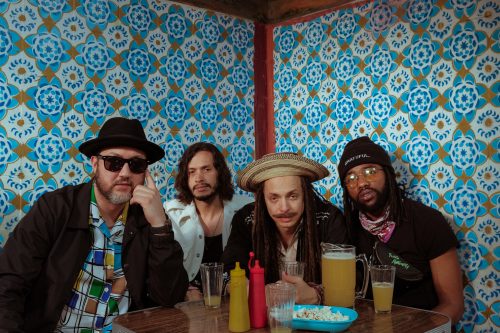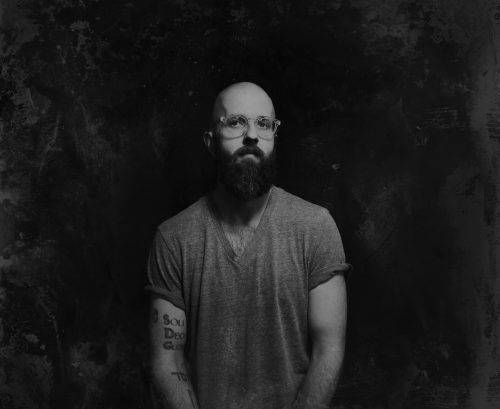Seemingly a genre into itself, the Afro Latino band Making Movies has blended the sounds, languages and attitudes from the cultures that have given rise to the band members themselves. Formed in Kansas City, Making Movies is an American band in every sense, including the immigrant story at its heart. Enrique Chi (vocals and guitar) moved from Panama when he was 6; he’s joined in the band by his brother Diego Chi on bass, percussionist Juan Carlos Chaurand, from Mexico, and newest member, Duncan Burnett, from Kansas, on drums.
Its fourth album, “XOPA,” is set for release on June 17, following up on “ameri’kana,” its 2019 full-length. “XOPA,” sung entirely in Spanish, features guest performances by Rubén Blades, Marc Ribot, Dolores Huerta, David Hidalgo of Los Lobos and Alaina Moore of Tennis.
This morning, the band shared the title track of “XOPA,” following the previous singles “Calor,” “Sala De Los Pecadores” and “Porcelain” (featuring Tennis).
We recently spoke with Enrique Chi about Making Movies’ deep connection with its mentors, how a Peter Gabriel song opened his ears and eyes to activism in rock and the purpose behind the band’s live show, which you can see for yourself at Mercury Lounge on Thursday, June 9 and World Cafe Live in Philadelphia on July 13.
Why did you decide to do record your upcoming album completely in Spanish?
I think that I haven’t answered this question yet, so this is the first time it’s come up. We started the process right at the beginning of 2020, and we all know what happened shortly thereafter. I think that as we were working on this music, in order to write songs in two languages, I’m actually cultivating two different artists, like different voices in a way. And I wanted to just hone in on one and really feel comfortable and feel like diving into one character, basically. The last record was thinking about more global ideas and social ideas, and they’re present in this record, but growing up as a Latino person, it’s more about me than our perspective on the world in our society, so I felt that I needed to back to my first language and really hone in. Ron Swanson on “Parks and Recreation” said it’s better to whole-ass one thing than half-ass two things, so that was kind of the perspective.
I also have to admit that living in the United States writing in Spanish has been a hurdle for reaching English media and English [language] festivals. We would be releasing a song in English, and because some of our music is in Spanish, “We’ll play you on our special Latin show on a Saturday night.” If it’s in English, why are we in the corner? We had an English song written by Lou Reed and Rubén Blades [“Delilah”], and we had the same experience. It was amazing — why are we in the corner of your curation? So we kind of let go of that idea. We were going to get that response either way, so let’s write a full album in Spanish.
What artists inspired you to use your platform to become an activist?
I think all of my favorite artists as a kid. My dad is a rock and roll head. He loved telling me about everyone from The Beatles to Peter Gabriel. I remember specifically talking to him about a Peter Gabriel song and the social situation that Peter Gabriel was writing from, I think it was “Biko.” We crossed paths with Los Lobos, and they became allies and mentors to us, and they do it gracefully. They support causes but aren’t an activist band. Rubén Blades has threaded it throughout his whole life, and we made the song together, he kind of coached me on how to do interviews and describe different ideas without being tied to any particular concept.
Tell us about some of the amazing guest performers on “XOPA.”
I think it ties back to what I was saying about being blessed to have met these mentors who have helped us along the way. Everyone on the record has played some role in that for us. Alaina and I grew up together. We met when we were 17 and we kept a friendship and went on our separate ways. She was literally off the grid. A couple years ago I had seen what she was up to and said, “Oh, cool.” Then her career took off and it’s been really fun to see it. She and her husband have been really beautiful examples in my life of folks who are navigating music as a career and their relationship, and Alaina has always had this magic power, even if we haven’t talked in a while, she can cut right to the quick of the thing I am actually going through.
David Hidalgo and the whole Los Lobos family, when we started playing shows with them, backstage it was like a family. This kind of just openness. All of the folks on the album, Dolores Huerta inspired me to learn about her story. She’s been kind of a leader we look up to.
That’s the message of our album, these folks who have been lifting us up, whether they were intentionally doing it, or by them being who they are, and the beautifulness of that and how much as humans we all need that in our lives.
What is your intention when you take the stage to perform?
I think the intention is of course to present this music, which is parallel to the message. That’s also another thread on the album. Since having written “No te calles” with Rubén, which was a show closer for us, we would drag that song out, and it was the high-energy point of the show. We wanted this record to start there. We wanted every song to be more extreme — more intimate if it’s intimate; if it’s big and loud, bigger and louder than anything we’ve ever done. The tunes feel bigger now. Now “No te called” isn’t the closer, it lives somewhere near the middle.
This interview has been edited for length.
Photo by Felipe Rubilar




Leave a Reply